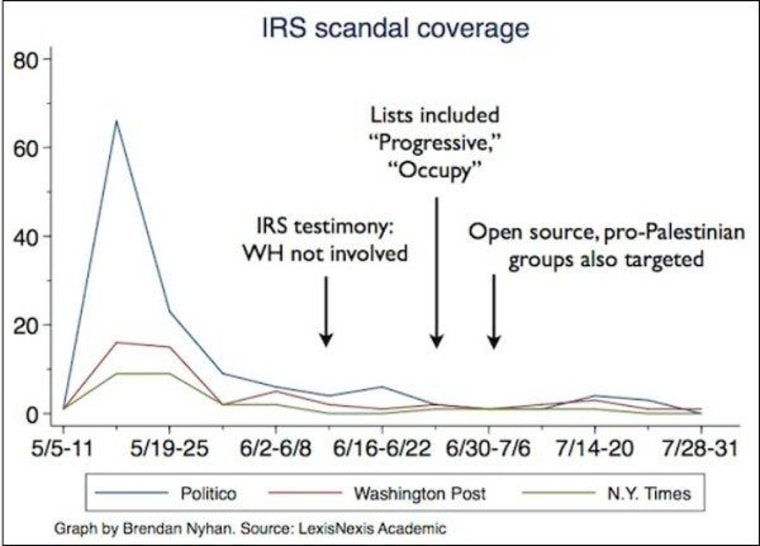The discredited IRS "scandal" is more than just an example of congressional Republicans over-promising and under-delivering. It's even more than a political world, desperate for something new to play with, failing to look before it leaped.
The story also offers a terrific case study in how major news outlets pounce on a story, only to lose interest when facts challenge their assumptions. Political scientist Brendan Nyhan published a gem yesterday for Columbia Journalism Review on the "scandal attention cycle." The piece included this chart:
The image should probably be fairly self-explanatory -- we can see how the New York Times, Washington Post, and Politico, "which are arguably the three most important sources of national political news and often set the agenda for coverage by other press outlets," covered the IRS story from start to finish.
Nyhan explained what happened immediately after the story broke:
The New York Times published nine stories, including five on the front page; The Washington Post published 16, including eight on A1; and Politico ran an incredible 66, including 12 that appeared at the top of its home page. But as contradictory facts emerged in June and early July, they had already lost interest, publishing a fraction of the stories that ran during the initial weeks of the scandal.
Obviously, Politico's poor judgment offers an extreme example* of a news organization making misguided editorial decisions that appear almost ridiculous in hindsight -- 66 stories on a story that turned out to be nothing? -- but most major outlets, even "The Daily Show," ran with the IRS "scandal" as if it were an important and legitimate controversy, then lost interest when reality intervened.
It's tempting to chalk this up to human nature -- there's a major event, and everyone pays attention, but as time passes, our attention wanes and we lose interest. It happens all the time, and it's understandable.
I'd argue, however, that what happened with the IRS story is something slightly different.
If the political world took a keen interest in this controversy when it first came to public light, then moved on when there were no new developments, it'd be fairly routine. But that's not quite the case here -- rather, the IRS story broke, news organizations pounced, and then proceeded to ignore new developments that undermined the legitimacy of the story itself.
Outlets didn't move on when nothing happened; outlets instead made a conscious decision not to report when all kinds of things happened -- things that made the story itself appear baseless.
In other words, in this case, the media only cared about the allegations from Republicans, not the evidence that proved those allegations false. The political world was obsessed for weeks with the questions, then found the answers boring and not worth sharing with the public.
When the right screamed bloody murder, major news organizations followed the herd. When the left said, "You know, maybe the public would benefit from hearing about the evidence that the administration didn't actually do anything wrong," the political world shrugged its shoulders and found some new toy to play with.
Liberal media, indeed.
And why does this matter? Aside from the fact that accountability should still have some meaning in American politics? Perhaps because misguided coverage of a phony controversy led the public to believe President Obama, the White House, and the IRS itself were responsible for serious misdeeds. The taint of "scandal" remains, for no reason other than the political world told the public about allegations, but decided the evidence to the contrary wasn't important.
* Update: Dylan Byers raises a fair point in Politico's defense noting that the total number of pieces doesn't reflect the fact that Politico simply runs more articles than the Post and Times. As a percentage, all three were roughly the same in hyping this faux scandal, and the Washington Post was arguably the worst of the bunch when it came to giving the story front-page treatment.
